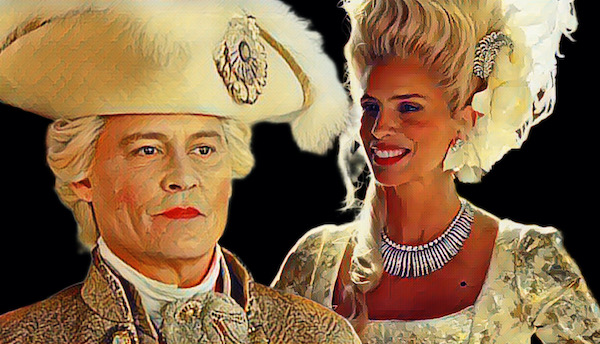230 years ago, both Marie Antoinette (executed on October 16, 1793) and Jeanne Du Barry (taken to the guillotine in December of the same year) died at the hands of the French Revolutionaries. The Queen’s life was obviously more explored in literature and cinema, with the adaptation of her biography by Sofia Coppola, considered to this day the main reference as a film in 2006. Marie Antoinette had an impact on actress and director Maïwenn, who opened the 2023 Cannes Film Festival with the film dedicated not to the Austrian noblewoman, but to the Frenchwoman and her antagonist, Jeanne Du Barry. The film, starring her and American actor Johnny Depp, was extremely popular and… massacred by critics. Rightly so.

As Maïwenn explained, Asia Argento‘s performance in Sofia’s film was what had the greatest impact on her, and since then she has determined to explore the story of King Louis’s nobles. An easily tragic figure, who, unfortunately, is once again condemned to a bad narrative.
Jeanne Du Barry‘s life is fascinating, her beauty was undeniable, but the paradox of being a classless woman in the face of snobbish French society, but intelligent enough to be the patron of intellectuals like Voltaire, not to mention the love that the King adored for all dedicated to her in the last six years of her life certainly deserve a current review. The French director and actress, who also wrote the script, is the biggest weak link in the initiative. She reviews important moments in a superficial way, we are unable to embark on the complex soul of the courtesan or her relationship with Louis XVI.
Without being able to interpret it well, it is even more difficult to find it daring that, in addition to Sofia Coppola‘s film, Maïwenn cited other influences such as Stanley Kubrick (Barry Lyndon) and Albert Serra (The Death of Louis XIV) as the basis for Jeanne Du Barry. The three productions, she highlighted, had few dialogues and precisely for this reason required more consistent interpretation. “She” doesn’t deliver, the others do, but the film is about Jeanne, with the character on screen 95% of the film’s time. Maïwenn does not convey any empathy to us and is left without much explanation, not even Louis XV’s passion for Jeanne, or even less the nobles’ irritation about her connection with the King.
In the film Marie Antoinette, Sofia passed on to us the version that dominated France at the time, that Jeanne, classless and openly libertarian, enchanted the monarch by her voracity for life, as well as by her sexual performance learned in the houses of prostitution in Paris. Asia Argento‘s Jeanne is classless and insecure, but that is precisely why she provoked rejection from the Royal Family, including Marie Antoinette. In Maïwenn‘s film, we learn that she had an education that only wealthy families would have, but that she chose to be a courtesan because she liked sex, even though in the two scenes in which she is actually participating she is observing more than acting and is later raped. We see nothing that justifies the legendary reputation as a lover that was linked to her biography, a version that is certainly sexist, but which remains unchallenged.

Jeanne Du Barry‘s production, shot entirely in Versailles, with heavy costumes and soundtrack, does not support the script, which seems like a poorly finished script. The one who minimally “saves” the complete failure is Johnny Depp, in a later return to the screen. three years of much personal turmoil. Johnny didn’t even go. first choice for the role, although he is at the right age for him (Louis XV was 58). Maïwenn wrote the film with a French actor in mind, whose name she did not reveal, but who rejected her after three years without responding. The second French option also declined the opportunity due to “health problems”. The director then started wanting American stars for the film, inviting an undisclosed actor who she was not interested in and finally arriving at Johnny Depp, who agreed. Still, due to the actor’s personal problems, the project was put on hold between 2019 and 2022, when the recordings took place.
The choice of a few dialogues helped the actor who doesn’t speak French fluently, but if it weren’t for his talent even that would be bad. Perhaps due to the reflection on his life, Johnny Depp manages to convey a more tired, almost taciturn king who sees in Jeanne’s joviality, a slow person in a suffocating and decadent Court like Versailles was already at the time. Their relationship is affectionate, it is the opposite of the noisy Asia Argento and Rip Torn in Marie Antoinette, there is a growing complicity that makes it a shame not to have been better developed.

Another performance that stands out and ‘saves’ Jeanne Du Barry is that of Benjamin Lavernhe as La Borde, the faithful valet of Louis XV. The sensitivity with which he treats the unlikely couple is what makes us care about a love story that to this day is not well addressed.
But the real missed opportunity is to have the best character – and a real one –such as Jeanne to reflect on all the problems that accelerated the French Revolution years later. As mentioned, Jeanne was a victim of bullying, prejudice, defamation, and sexual and moral harassment for being “a woman of the people”. Everything she faced in Versailles, with her head held high, was what the French nobility did not understand or accept. Hence the greater tragedy of having been a woman who was soon afterward executed by the people for having been linked to the nobles. Not to mention it’s the beginning of the incredible story of the diamond necklace. None of this is even hinted at, missing the entire context of the final quote that before her death, Marie Antoinette became her friend. This was a story to be explored! We’ll have to wait for another woman to review all of this. Unfortunately, Jeanne Du Barry is not that film.
Descubra mais sobre
Assine para receber nossas notícias mais recentes por e-mail.
